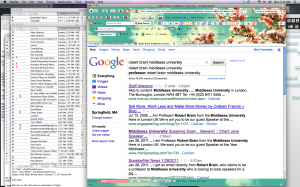Urgent: Speakers, Beware the Middlesex University Scam
Early this month, I got an e-mail from a Professor Robert Brain, inviting me to speak at my full fee plus expenses for a rapidly upcoming conference in England. The topic he proposed was a bit off my usual topic, but one that I could handle.
Follow-up mails from a Professor Woodman Walker included a letter of agreement to sign and requested more information from me. I wanted to find out more about the parameters of the speech, so I asked for some phone time. Our interview was scheduled for 8 a.m. my time this morning.
In the meantime, I had asked my good friend Google to tell me what it new about these two “gentlemen.”
The results were not encouraging:
One of the links on that page led me to a full account of how the scam works. I also checked the Middlesex University staff directory. Oddly enough, the phrase “Robert Brain” brought back a listing of the staff directory, as you can see in the screen shot–but when I clicked through the directory itself, neither Robert Brain nor Woodman Walker showed up.
Now, I’ve had a few speaking requests that seemed pretty flaky at first, and turned out to be real. So I was willing to give him the benefit of the doubt. Here’s an approximation of how the conversation went:
Me: “Good morning, this is Shel. How may I make your day special?”
Him: “This is professor Woodman Walker of Middlesex University, UK.”
Me (big, hearty): “Good morning, Professor. The first thing I need from you is the names, off the top of your head and you can give me contact information later, of three people who’ve spoken for you in the last year. There are some rumors about you on Google.”
Him: hangs up.
Speakers—be suspicious of any e-mail that asks for banking information in order to get a work permit (I didn’t get that far with him)—and don’t be surprised if a similar scheme shows up allegedly from a different school and different professors.
You’ve been warned!
